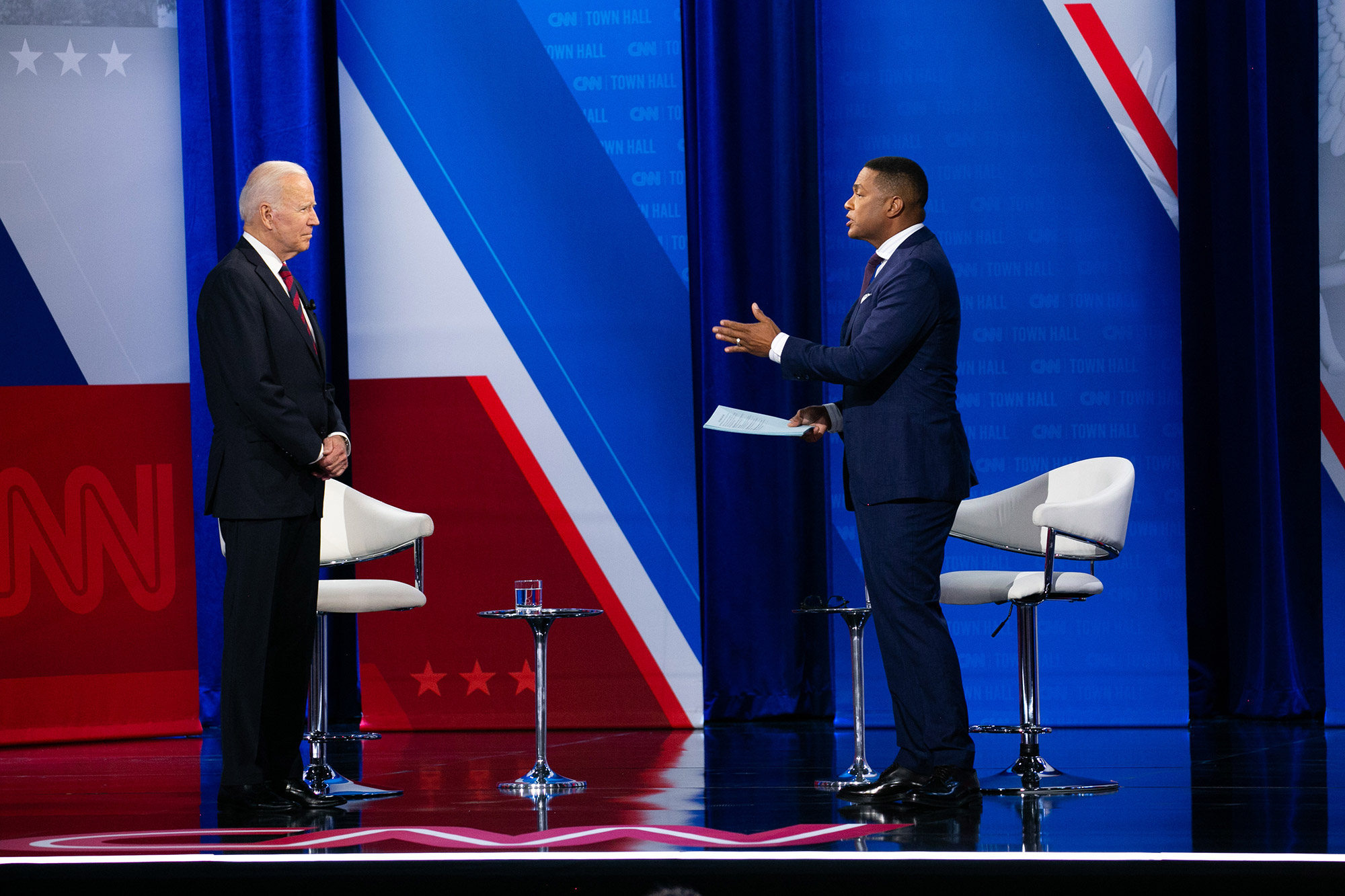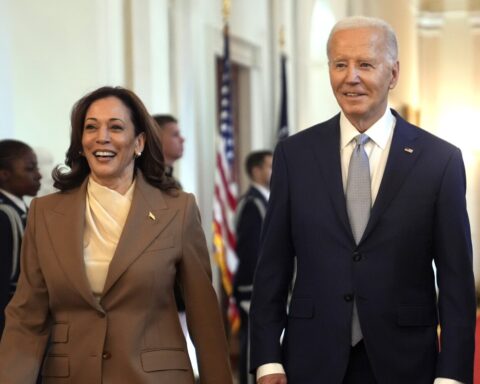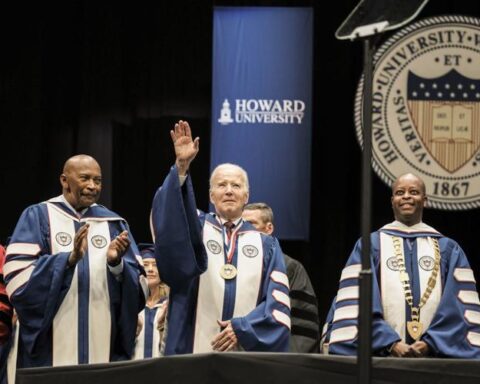President Joe Biden arrived in Ohio on Wednesday mindful the days for actual bipartisan governing in Washington are quickly waning.
Throughout his CNN town hall, he voiced again and again his conviction that Republicans will come along, even though some are poisoned by conspiracies and others, he said, are “lying” on his record.
He was confronted with open skepticism by some of his questioners, particularly on the matter of voting rights. But he plodded ahead, elevating his belief in bipartisanship as nothing less than a quest to prove Democracy can work.
It was a reflection of the place Biden finds himself six months into his presidency. It’s too early for him to give up on his pledge to unite the country. Yet the window for getting something done with Republicans is closing.
Here are five takeaways from the town hall:
‘This is not a pandemic’
The first six months of Biden’s presidency has been overwhelmingly focused on combating the Covid-19 pandemic. Until about a month ago, the President and his team were feeling understandably good about their progress as cases plummeted alongside a successful vaccination campaign.
But the vaccination effort has stalled. And case counts, fueled by the highly transmissible Delta variant, are rising. Biden was visibly frustrated at his predicament on Wednesday, which he suggested was fueled by vaccine disinformation proliferating in conservative circles.
“There’s legitimate questions people can ask if they worry about getting vaccinated, but the question should be asked, answered and people should get vaccinated,” Biden said. “But this is not a pandemic.”
“It’s frustrating,” he went on, seeking to downplay the current surge as a pandemic only of those who have refused to get shots.
Amid the spike in cases, Biden’s aides have sought to underscore the real progress they’ve made on the pandemic, mindful his ability to contain the crisis will be how voters overwhelming judge him. They have been resistant of returning to earlier levels of crisis messaging, understanding the effect it might have on national impressions of progress.
RELATED: Why the Delta variant is spreading so much faster than other coronavirus strains
Still, Biden acknowledged some pandemic-era restrictions would have to persist, even as he hails the progress he’s made since taking office in January. He predicted the US Centers for Disease Control and Prevention is going to recommend that everyone under the age of 12 “should probably be wearing a mask in school.”
Selling the plan
Biden entered Wednesday’s town hall just as a test vote failed on his much-touted bipartisan infrastructure plan, an early blow that Biden declared “irrelevant.”
RELATED: Here’s how Biden’s infrastructure plan would impact key areas of American life
Still, he and his aides have signaled the coming weeks will be essential for enacting his sweeping agenda before midterm election season heats up. So, too, is the clock ticking on fulfilling his campaign promise to work with Republicans to prove that democracy is still functional.
Biden acknowledged it was a question he’s receiving from foreign leaders, who asked him whether the US will “ever get it together.” And he said a proliferation of conspiracy theories was making working together more difficult, citing one that “Biden is hiding people and sucking the blood of children.”
Still, the President insisted working together remained his north star, including when he was questioned by a member of the audience about the “utopian need to gain bipartisan support.”
“I may be the wrong guy to talk to,” Biden warned, an acknowledgment he wasn’t planning to give up any time soon on his insistence that Republicans and Democrats can work together.
RELATED: What are the odds Biden can un-stall the rest of his agenda?
He said he was haggling with Republicans and Democrats alike, saying the compromises are “real” and noting there have to be compromises within his own party “between the far left and the center and some of the folks who are more conservative.” And without prompting, Biden name-checked Ohio’s Republican senator, Rob Portman, 25 minutes into the event. Portman is among the senators negotiating the bipartisan infrastructure plan, and Biden’s flattering message was laced with his expectations.
“I come from a tradition in the Senate, you shake your hand, and that’s it, you keep your word,” he said. “And I found Rob Portman does that.”
Tough economic love
Politicians are ordinarily wary of bearing bad news. Biden has insisted he won’t sugarcoat the facts. And on Wednesday he delivered somewhat unwelcome economic news in two separate answers.
He acknowledged current price increases were real when questioned about an overheating economy. And he frankly told a restaurant chain owner that he’ll continue to struggle hiring workers for the foreseeable future — and suggested the restaurant owner raise wages.
It was some tough economic love. But Biden was trying to make a point about the major changes he is trying to affect on American workers’ lives in his first year in office, convinced whatever side effects being felt right now pale in comparison to the larger benefits down the road.
RELATED: Everything is getting more expensive. Is it time to worry?
“There will be near-term inflation because everything is now trying to be picked back up,” he said, detailing how his economic team has advised him current price increases won’t last as demand returns to normal levels.
Biden has come under fire from Republicans for injecting trillions of dollars into the economy at a moment when inflation fears are percolating. But he pointed to economists who say the two plans he is pushing in Congress would actually drive prices down.
When the restaurant owner stood up to ask how to incentivize workers coming back to work amid a nationwide struggle to retain employees, Biden acknowledged it may take some time.
RELATED: More people looking for — but not taking — jobs after their unemployment benefits end early
“I think it really is a matter of people deciding now that they have opportunities to do other things. And there is a shortage of employees, people are looking to make more money and and to bargain. And so I think your business and the tourist business is really going to be in a bind for a little while,” Biden said.
Asked if expanded unemployment benefits enacted during the pandemic are playing a role in worker shortages, Biden acknowledged they could be: “Let’s assume it did, but it’s coming to an end.”
But he said raising worker pay would prove a more sure thing, suggesting a $15 per hour rate could attract a more reliable workforce.
“But you may pay that already,” he said.
Filibuster bust
Nowhere is Biden’s reverence for the traditions of Washington more scrutinized than on the filibuster, which progressives blame for stalling progress on any manner of items — but mostly on voting rights bills that have failed to gain any traction among Republicans.
Biden bemoaned the fact the two items — voting rights and the filibuster — have become so intertwined, though the legislative progress is inherently linked to the existence of a rule requiring a 60-vote threshold on most bills.
Biden has said that he’s open to changing the filibuster to require senators to speak on the Senate floor as they hold up bills. But he has stopped short of backing some Democrats’ calls to eliminate it altogether.
RELATED: Why Washington gets so little done
It was likely an unsatisfying answer to the incoming law school student who asked Biden about the logic of getting rid of the filibuster to “protect our democracy and secure the right to vote.”
But Biden seemed to suggest that changing the rules now would forestall getting any of his legislative agenda through — and while he insists voting rights are his top priority, more progress is likely in Congress on his infrastructure and families plans.
“The abuse of the filibuster is pretty overwhelming,” Biden admitted on Wednesday — but later said gutting it would “throw the entire Congress into chaos and nothing will get done, nothing at all will get done.”
The cage is still gilded
The last time Biden participated in a CNN town hall, he likened living in the White House to residing in a “gilded cage,” telling Anderson Cooper that he was unused to being waited upon by staff.
Things have not changed much since then: He said on Wednesday that he missed being able to emerge from his bedroom for breakfast in a robe in morning. And he’d like to put on shorts and a T-shirt to stroll around outside.
RELATED: Biden: The first time they played ‘Hail to the Chief’ I asked, ‘Where is he?’
The moment it sank in that he is now president — the leader of the free world — was on his June trip to Europe, Biden said, when he sat across from leaders like Russian President Vladimir Putin as an equal.
“He knows who I am. I know who he is,” he said.
Indeed, Biden appeared in his element while abroad, seizing the four decades he’d spent climbing the ranks of American foreign policy to finally lead the nation’s affairs.
Still, he acknowledged it has taken some getting used to hearing “Hail to the Chief” when he walks into events.
“I went, ‘Where is he?'” he said of the first time he heard the opening strains. “It’s a great tune but you feel a little self-conscious.”





